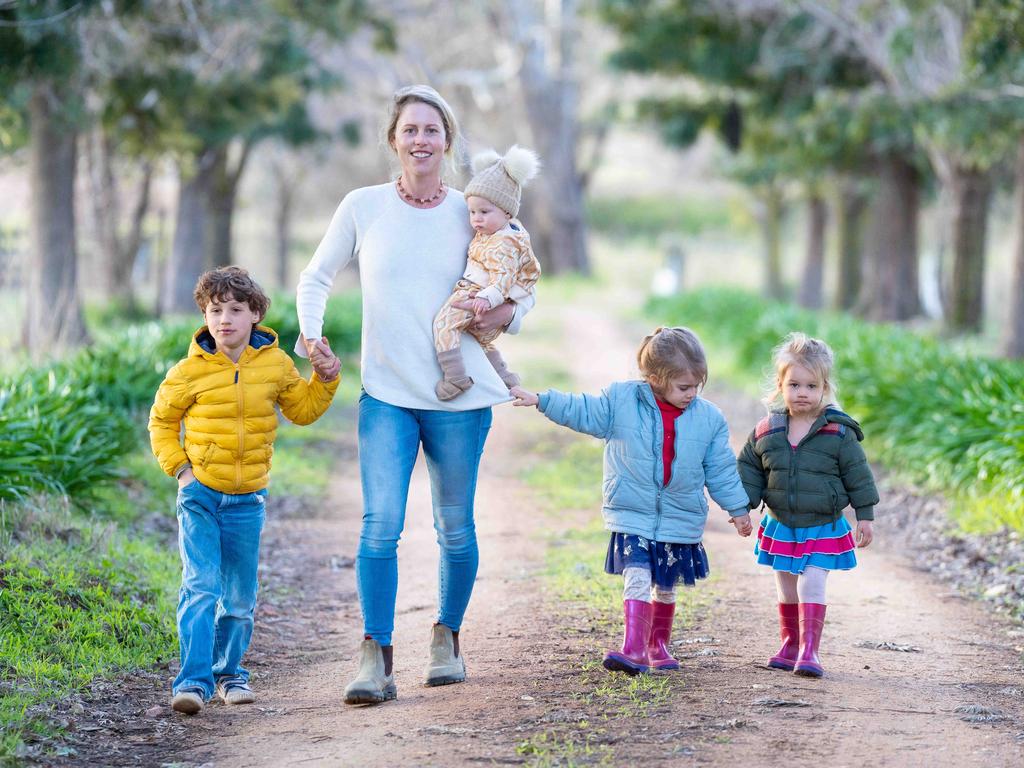When tragedy struck, I learned how a village truly works
There is a long list of great acts of kindness shown to us during a terrible time – but for some reason I will never forget the roses.

Five years ago we drove our growing family 12 hours south for a higher-paying job. We didn’t know a soul. I had to use Google Maps to find my way to anywhere. I was pregnant and had two kids under four. We weren’t to know it then but the community we moved to was about to show us the meaning of “having a village”.
I thought I knew what community was about, but I’d grown up with my entire family in the same postcode. I took that sense of belonging and unwavering support for granted. My family was my community. I relied on them and, particularly as a younger person, offered not much in return. I enjoyed the fruits of community but did none of the labour.
I left the nest for school, university and then my first job. By that stage I was young, child-free, had my own money and had work friends. A kind of self-reliance set in and, other than social events, I had little need for community in a practical sense. I could do it myself or pay someone for help. This is how I never got around to learning how the village actually works.
Anyway, roughly three months after we moved across the state Covid lockdowns began. By then I had three children under six and spent long hours without any adult company at our home. We lived on a farm out of town and the isolation crept up on me. Things started to go downhill. Not long after that my sister died.
The first thing that happens in a true village is people don’t give vague offers for help – they know what needs to be done and they do it. “Is it OK if we come on Wednesday to prune the roses?” the text message read. I remember being mildly shocked that someone would volunteer themselves in this way. There is a long list of great acts of kindness shown to us during that terrible time but for some reason I will never forget the roses. The way people just materialised to help us, who weren’t family and were not being paid, was foreign to me.

After a time, when things felt more manageable, I tried my hand at giving back. Just little things and very infrequently. Dropping off food in a tough time or looking after someone’s children for a few hours here or there. It felt good but I gradually resumed my bid for complete self-sufficiency. I didn’t want to rely on people, it didn’t feel fair – maybe because I felt I couldn’t or wouldn’t always be able to repay them in kind. With community comes a balance you can never quite settle. I was noncommittal about entering this imprecise social contract.
I started looking for paid help, a nanny to come out one or two days a week. A string of women arrived at my door but none lasted. They didn’t do anything wrong, it just didn’t feel right.
Then out of the blue a woman from our touch football team became available for babysitting work. She was and still is a dream come true. She is paid but the community ties were there, we had a little shared history and the kids already knew her.
In the end, I’m pretty sure the nanny was more for my benefit than the kids. She became a great friend and I looked forward to her company on a Thursday. She is priceless and somehow her paid help feels outside the bounds of a commercial transaction. That’s what I’m telling myself anyway.
I did make other friends over time, friends who aren’t on the payroll, but the market economy is inevitably marching in to fill the void left by the absence of village and informal help. Committees and volunteer-led organisations everywhere are dying or remunerating positions. You can pay someone to be at the birth of your child, a doula, and you can even pay someone to help you in the weeks after the birth – a postpartum doula.
The examples of this commercialisation of what previously were deeply personal community functions are endless but quite necessary, and often very effective as a substitute paid village.
Still, caution must be exercised with how much we let commerce take over informal, interpersonal relations. Something is lost when money changes hands – that person is now there, at least in part, because you paid them, not because they care about you as a person. Conversely, paying someone for their services removes part of the social contract for the payer. You are less obligated to be a nice person precisely because you paid them and you expect them to do their job either way.
The interaction is contingent on payment rather than preserving the relationship. If you don’t like them or the job they do, you can simply cut ties.
In 2000, researchers from the University of California found that introducing late fines at a daycare centre increased the instances of late pick-ups rather than deterring them. Why? Because when parents knew staff were staying late on their behalf without recompense they were much more keen to prevent the situation occurring. But once they knew they could pay to be late, the social contract was negated.
A lot of people claim to want a village but I don’t think they realise that this involves input and effort, forgoing an amount of leisure time and possibly even lost income. It’s not a one-way street. Time is money and many people would say they simply could not afford to contribute their time. It’s also undeniably about our priorities. We can’t strive for something that we don’t really understand when money is the only language we speak.
Having a village also involves social interactions that can be awkward verging on painful and dealing with people who aren’t your cup of tea. People who form the village aren’t robots, they are diverse and they aren’t as reliable as an employee. Having a village will require more social interaction than a lot of people are willing to give. Deep down, people don’t want or can’t manage the unreliability of dealing with people in an informal setting. A village can be inconvenient.
The difficulty of the village is also that it must reach critical mass to operate effectively. You need a whole group of people to collectively agree to pool resources that may then be shared and drawn on in time of need. This increases the likelihood of diverse skill sets and everyone being able to chip in to get things done.
Villages and the “in kind” contributions they rely on don’t work when it’s only a handful of people operating outside the formal economy. Depopulation of our informal villages has occurred through later retirement ages, driving mothers back to work from earlier and earlier ages and a general culture that values overwork, material possessions and professional success over connection, community and common decency. Villages are starved of people to contribute, who understand how it works, which leaves them weak and dysfunctional.
The benefits of a village were shown to me by the kindness of others and across time I gradually realised how much you get in return. It was only by learning from others how rewarding, helpful and necessary the village is. I also had the benefit of having a mother who volunteered and contributed, so I had a rough idea of what contributing meant. Many people never find themselves in a well-established community that can take them under their wing and show them the ropes. Some people are never shown one of the last remaining vestiges of humanity outside the market economy.
Little by little our unpaid village appeared and we put our roots down. We joined a few committees, a couple more sports teams and a book club to which I am wholly devoted. My neighbour teaches me pilates free of charge. We contribute our time and effort, I feel more comfortable accepting help, though I still compulsively try to pay people for their help. The capitalist in me is constantly at war with the socialist.
When I tore almost every useful ligament in my knee a few weeks ago I still struggled to accept the help, people arriving at my door ready to clean or bearing pre-cooked meals. I’m eternally grateful for the help, but my social conditioning and my yearning for an exactness in the transaction means I compulsively try to pay people.
For example, a friend’s daughter is playing with my son as I write this. She is on school holidays and a delightful girl – I am positively dying to slip her a few notes at the end of the day. But the offer of help was made on the terms that payment is not necessary because we are a village and if I pay her am I relieving myself of the obligation to repay the favour in kind.
I think today the capitalist in me may have a win.







To join the conversation, please log in. Don't have an account? Register
Join the conversation, you are commenting as Logout